Many people rely on handed-down advice or popular tips when it comes to perfumes—but is everything we know about this world actually true?
In today’s article from Jasmine, we’re debunking the top 10 air freshener and perfume myths—even some that professionals still believe. Get ready to rethink what you know real facts. Let’s dive in.
Top 10 Air Freshener and Perfume Myths
1. Rubbing Perfume for a Long-Lasting Scent
Many believe that rubbing perfume into the skin after spraying helps it last longer. In reality, this habit does more harm than good. Perfume is made of delicate chemical compounds, and how you apply it directly affects its longevity and scent.
What happens if you rub perfume on your skin?
Rubbing your wrists or neck after applying perfume generates heat through friction. This heat accelerates the evaporation of the fragrance’s top notes and can break down its chemical structure, altering the intended scent. As a result, lighter notes vanish quickly, and the overall quality of the perfume is compromised.
How to apply perfume for the maximum effect?
- Spray from a distance of 15–20 cm for even distribution.
- Avoid overapplying—it can overwhelm the senses and alter the experience.
- You can also spray it on clothing, but test it first to avoid staining delicate fabrics.
- Apply perfume to clean, moisturized skin—dry skin absorbs scent faster and fades it sooner.
- Never rub the perfume after spraying—it crushes the fragrance molecules and reduces its staying power.
- Target pulse points like the neck, behind the ears, wrists, and inner elbows. These warmer areas help diffuse the fragrance.
Also read: Top 10 Import Companies and Websites from Turkey (Full Guide)
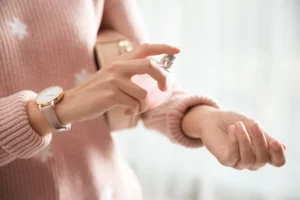
2. Freezing Perfume Make It Better
Many people, hoping to preserve their perfumes for as long as possible, consider storing them in the freezer.
But what effects when perfume is exposed to extreme cold?
Cold temperature
Freezing doesn’t “age” or improve a perfume—it can damage it. Sudden or prolonged exposure to extreme cold disrupts the delicate chemical balance of the fragrance, altering its intended scent.
Chemical decomposition
Repeated freezing and thawing weakens the chemical bonds between the fragrance ingredients. Over time, this degrades the scent’s quality and reduces its longevity on the skin.
Moisture Exposure
Freezers are humid environments. If moisture enters the perfume bottle, it can react with the fragrance oils. This causes oxidation, leading to a change in both the color and smell of the perfume.
Perfume Bottle
Not all perfume bottles are designed to withstand freezing temperatures. The glass may crack, or the spray mechanism could become damaged, leaving the perfume exposed to air and light—two key factors that accelerate spoilage.
Volatile Compounds
Extreme cold can affect how alcohol and volatile fragrance compounds behave. Over time, this may lead to unwanted evaporation, reducing the scent’s intensity and concentration.
Want to know the best way to store your perfumes? Contact our Jasmine team—we’re happy to guide you on proper storage to keep your fragrances at their best.
Also read: Perfume Storage: Is it Good to Store Perfume in Fridge?

3. Alcohol in Perfume Ruins the Scent and Lowers Quality
A widely held belief—perhaps even one you’ve shared—is that alcohol negatively impacts the quality of perfume. But in reality, this couldn’t be further from the truth.
Let’s break down the facts:
Alcohol is a Key Solvent
Alcohol plays a crucial role in perfume formulation. It allows concentrated fragrance oils to blend into a usable liquid. Without alcohol, perfumes would be thick, oily, and impractical for direct skin application.
Alcohol Helps in Dispersing Fragrance
Because alcohol evaporates quickly, it helps disperse the scent when sprayed. This evaporation creates the “scent trail” and allows the top, heart, and base notes to emerge in layers as intended.
Alcohol Makes Fragrance Last Longer
Alcohol acts as a natural preservative, preventing bacterial or fungal growth within the perfume. This extends the shelf life and ensures the scent stays stable and safe for long-term use.
Alcohol Preserves the Perfume Quality
Did you know that most high-end, luxury perfumes contain a high percentage of pure perfumer’s alcohol? Its presence is not a sign of low quality — in fact, it’s essential for optimal performance and olfactory experience.
In short, alcohol is not the enemy of your perfume—it’s what makes it wearable, enjoyable, and long-lasting.
Also read: Perfumers Alcohol: Types & Best Alcohol for Perfume
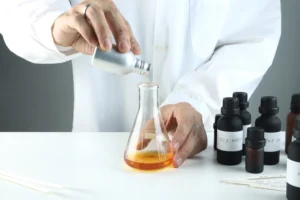
4. Perfume Color Indicate Quality or Longevity
Is the color of a perfume a sign of its quality or staying power?
Here’s the truth:
Color Is Often Just for Visual Appeal
In most cases, a perfume’s color comes from natural ingredients or added dyes purely for aesthetic purposes. These colors are designed to make the product more visually attractive—but they have no real impact on the scent’s quality or how long it lasts.
Quality and Longevity Depend on the Formula
What truly determines a perfume’s performance is the concentration of pure essential oils and the type of fixatives used. The color plays no role in this. It’s the harmony of the ingredients that delivers a long-lasting, high-quality fragrance experience.
So don’t be fooled by the bottle’s shade—the true value lies in the composition.
Looking for perfumes that strike the perfect balance between luxurious aroma and lasting power? Explore Jasmine’s curated collection.
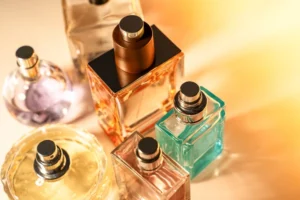
5. Using too Much Air fresheners Safe for health
To create a fresh and relaxing atmosphere at home, many people turn to quick solutions—like air fresheners. But are they safe?
Let’s take a closer look at what’s behind that pleasant scent.
Hidden Risks of Chemical Compounds
Most commercial air fresheners contain volatile chemicals like formaldehyde and phthalates. Prolonged or excessive exposure can irritate your respiratory system, trigger allergies, and potentially lead to long-term health issues.
Impact on Indoor Air Quality
Air fresheners don’t eliminate bad odors—they mask them with synthetic fragrances. This adds more pollutants to your indoor air rather than purifying it, making proper room ventilation far more important for a healthy environment.
Environmental Consequences
These products release volatile organic compounds (VOCs) that not only pollute the air indoors but also contribute to secondary pollutants. Overuse increases your carbon footprint and can negatively affect nearby ecosystems.
Moderation and awareness of what’s in your products are essential for protecting both your health and the environment. Visit our website to explore our collection of air fresheners made with high-quality, naturally sourced ingredients that meet international standards.
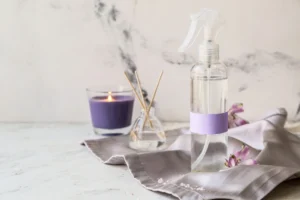
6. Assuming Stronger Air Freshenere Stays Longer
First impressions can be misleading—especially when it comes to air fresheners. A strong scent at the moment of use doesn’t necessarily mean it will last.
Let’s break down the real connection between intensity and longevity.
The Role of Composition in Longevity
That initial burst of fragrance is often due to a high concentration of fast-evaporating ingredients—like citrus notes or green aromas. These volatile compounds disappear quickly, causing the scent to fade not long after application.
Heavy Base Notes Are What Last
Long-lasting fragrances rely on Heavy base notes like woods, musk, or amber. These components evaporate slowly and anchor the scent, allowing it to linger for hours after the lighter top notes are gone.
Also read: Full Guide to Perfume Concentration Levels & Types
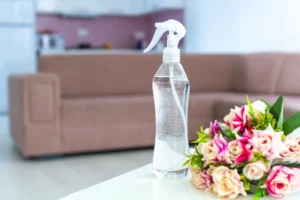
7. Getting Used to Perfume Smell
Ever feel like your favorite fragrance has faded—but others can still smell it on you? That’s not a sign of a weak scent.
It’s actually how your brain processes smells over time.
What Is Olfactory Adaptation?
Olfactory adaptation is a natural process where your scent receptors become less responsive to continuous or familiar smells. Your brain filters them out so it can stay alert to new or changing odors in your environment.
How to Train Your Nose to Keep Noticing Your Perfume?
- Occasionally use less fragrance than usual.
- Avoid spraying your perfume on the same spot daily.
- Take scent breaks—go a day or two without wearing perfume.
- Rotate seasonal scents to stay refreshed and aware of what you’re wearing.
- Switch up your fragrance every now and then to reawaken your sense of smell.
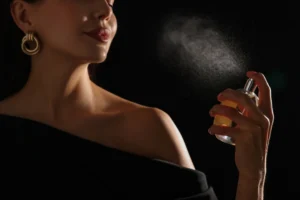
8. Assuming Higher Price means Better Perfume
We often associate high price tags with higher quality—but is a pricey perfume automatically better? Or are there other factors that define a fragrance’s true value?
The Marketing Illusion
A steep price often reflects branding, packaging, and advertising costs—not necessarily the purity or potency of ingredients. You’re often paying for the name, not just what’s in the bottle.
Ingredient Quality & Craftsmanship
Luxury perfumes do tend to use rarer, purer raw materials and advanced extraction techniques. These contribute to more layered scents, better longevity, and a more refined olfactory experience.
Longevity and Sillage
High-end perfumes often contain a higher concentration of essential oils, allowing them to last longer and project more powerfully. When crafted with skill, these fragrances evolve beautifully on the skin over time.
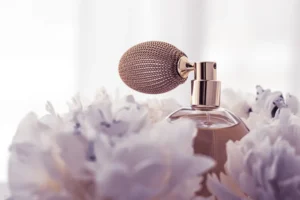
9. Spraying Fragrance on Clothes Better Than on Skin
Some people prefer spraying perfume on their clothes thinking it will make the scent last longer. However, this approach can have unintended effects on both the fragrance and your clothing.
- Perfume Interaction with Skin: Perfume reacts with your body’s natural chemistry, enhancing and evolving its scent layers perfectly.
- Stains and Fabric Damage: Certain ingredients in perfumes, especially oils and dyes, can leave permanent stains on fabrics.
- Altered Scent on Fabric: The fragrance may change when absorbed by synthetic or natural fibers, often not smelling as originally intended.
- Faster Evaporation: Fabrics absorb perfume quickly but lack the warmth of the skin, which helps release the scent gradually, resulting in reduced longevity.

10. Thinking that gender defines perfume composition
Perfumes have long been categorized based on gender, but developments in the fragrance world raise questions about the accuracy of these classifications. Are perfumes truly different by gender, or is the distinction driven by other reasons?
- No Ingredients Are Exclusive to One Gender: Fragrance components like rose, vanilla, and oud are used freely in both men’s and women’s perfumes.
- Classification Is Historical and Marketing-Driven: The divide between men’s and women’s perfumes evolved over time mainly for marketing purposes, not due to chemical composition differences.
- Scents Are Naturally Neutral: The human nose does not inherently distinguish scents by gender; fragrance is a deeply personal sensory experience.
- Personal Preference Is Key: Choosing a perfume is entirely about individual taste and desire, regardless of traditional categories.
- Unisex Perfumes Are Growing: The rise of unisex fragrances confirms that scent preferences transcend gender boundaries.
The line between men’s and women’s perfumes is fading—what truly matters is finding the scent that expresses who you are. Explore our wide collection at Jasmine that breaks traditional molds and offers fragrances tailored to your personality.